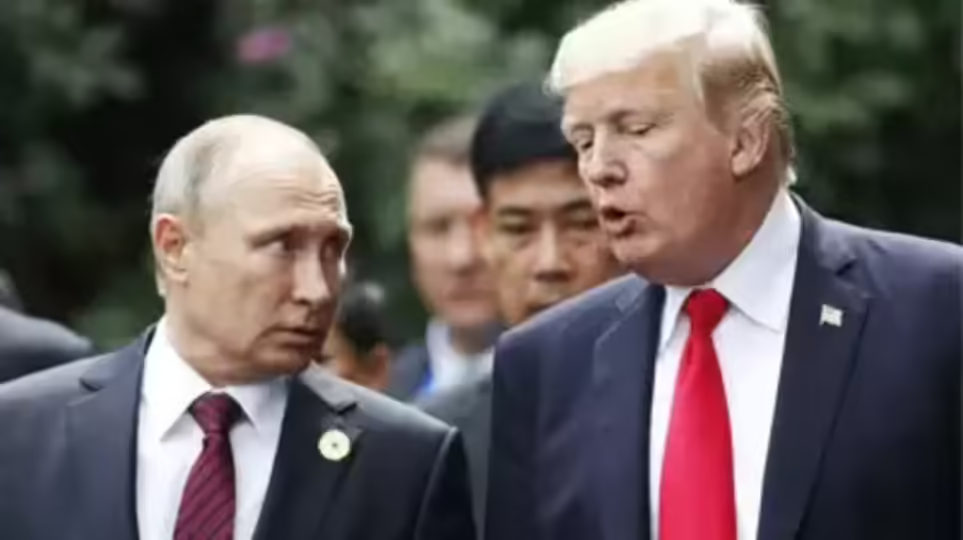Putin-Trump Call Looms Over Critical Phase in Ukraine Peace Talks
Tue, 18 Mar 2025

Russian President Vladimir Putin and U.S. President Donald Trump are scheduled to engage in a two-hour phone conversation today, according to a statement released by the Kremlin. The discussion, confirmed by Russian officials, coincides with ongoing multilateral negotiations aimed at de-escalating hostilities in Ukraine, where conflict has persisted for over 27 months. The call marks the fourth direct interaction between the two leaders since January 2023, with prior dialogues focusing on energy security, regional stability, and bilateral trade. Kremlin spokesperson Dmitry Peskov emphasized the "routine nature" of such exchanges but acknowledged the "heightened significance" of the timing, given recent diplomatic efforts to broker a temporary ceasefire in eastern Ukraine. The Ukrainian government, currently engaged in talks mediated by Turkey and Saudi Arabia, has reportedly sought assurances from Western allies that any bilateral U.S.-Russia discussions would not undermine Kyiv’s sovereignty or security interests. Data from the United Nations Human Rights Monitoring Mission in Ukraine indicates that civilian casualties in conflict-affected regions rose by 12% in the first quarter of 2024 compared to the previous quarter, with over 1,200 fatalities recorded since January. This surge has intensified calls for a durable ceasefire, though progress remains stalled over disputes related to territorial concessions and security guarantees. U.S. National Security Advisor Jake Sullivan confirmed that the Biden administration had been briefed on the scheduled call, reiterating Washington’s stance that "any resolution must prioritize Ukraine’s territorial integrity." However, analysts note that Trump’s influence within the Republican Party and his vocal criticism of current U.S. aid packages to Ukraine—which total approximately $75 billion since February 2022—adds a layer of complexity to the diplomatic landscape. Polling data from Pew Research Center reveals that 43% of Republican voters now oppose further military assistance to Ukraine, a 15% increase since late 2023, reflecting shifting domestic priorities. The Kremlin’s readout of the upcoming conversation highlighted energy cooperation as a key agenda item, particularly in light of Europe’s ongoing reliance on Russian natural gas. According to Eurostat, EU imports of Russian liquefied natural gas (LNG) surged by 21% year-on-year in 2023, despite sanctions targeting other sectors. This dependency has fueled debates within NATO about long-term energy strategies, with German Chancellor Olaf Scholz recently advocating for accelerated investments in renewable alternatives. Meanwhile, Russian state energy giant Gazprom reported a 9% quarterly profit increase, attributed to higher export volumes to Asia and favorable currency exchange rates. International responses to the Putin-Trump dialogue have been mixed. NATO Secretary-General Jens Stoltenberg cautioned against "unilateral negotiations" that might bypass multilateral frameworks, while Chinese Foreign Ministry spokesperson Wang Yi expressed support for "all efforts conducive to peaceful conflict resolution." China, which has deepened economic ties with Russia since 2022, accounts for nearly 28% of Moscow’s total trade volume, according to Russian Central Bank data. The European Parliament adopted a non-binding resolution last week urging member states to "remain vigilant against backchannel diplomacy" that could weaken unified Western sanctions. Historical context underscores the nuanced relationship between Putin and Trump, who have maintained sporadic contact since Trump’s presidency ended in January 2021. A 2023 report by the U.S. Council on Foreign Relations noted that Trump’s public praise of Putin’s "strong leadership" contrasts sharply with the Biden administration’s more adversarial posture. During Trump’s tenure, U.S.-Russia arms control agreements saw limited renewal, and bilateral trade declined by 18% due to sanctions. However, Trump’s recent social media posts advocating for a "negotiated settlement" in Ukraine have reignited debates about his foreign policy approach ahead of the 2024 U.S. presidential election. Ukrainian officials, including Foreign Minister Dmytro Kuleba, have cautiously welcomed external mediation but stressed that "no peace plan can be imposed without Ukraine’s consent." The Saudi-mediated talks in Jeddah, which concluded last week without a breakthrough, involved representatives from 42 countries but excluded Russia. A working draft of the proposed ceasefire agreement, reviewed by Reuters, includes provisions for humanitarian corridors and phased troop withdrawals but lacks enforcement mechanisms. Ukrainian President Volodymyr Zelenskyy has repeatedly stated that any deal must restore the country’s 1991 borders, a demand Moscow has rejected. Economic ramifications of the conflict continue to reverberate globally. The World Bank estimates that Ukraine’s GDP contracted by 35% in 2023, with reconstruction costs projected to exceed $500 billion. In Russia, the Central Bank revised its 2024 growth forecast downward to 1.2%, citing prolonged sanctions and reduced energy revenues. Meanwhile, the U.S. Department of Agriculture reported a 14% decline in global wheat exports from Ukraine and Russia—key suppliers—contributing to elevated food prices across North Africa and the Middle East. Security analysts speculate that today’s call may also address recent developments in NATO’s eastern flank, where the alliance has deployed an additional 12,000 troops since mid-2023. Satellite imagery analyzed by the Conflict Intelligence Team shows increased Russian military activity near Ukraine’s Kharkiv region, though Moscow denies plans for a renewed offensive. The U.S. Department of Defense confirmed last month that it had expedited delivery of F-16 fighter jets to Ukraine, with the first batch expected by late 2024. As the call proceeds, observers are closely monitoring potential shifts in rhetoric or policy announcements. While neither side has previewed specific deliverables, the interaction occurs against a backdrop of escalating geopolitical fissures and economic strain. The outcomes, or lack thereof, may shape the trajectory of not only Ukraine’s conflict but also broader East-West relations in the coming months.
